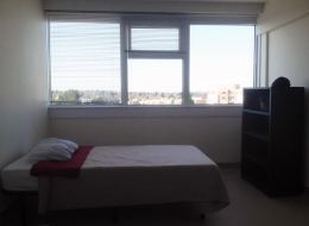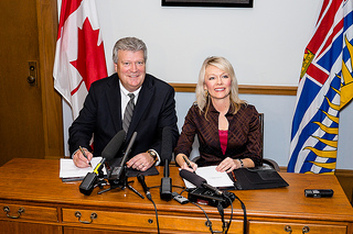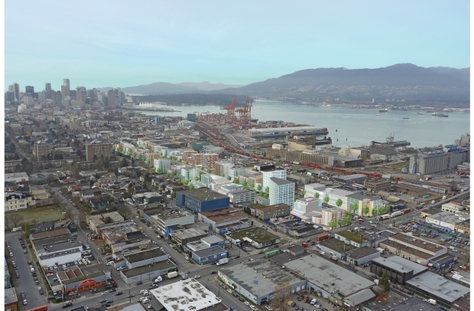 HUFFINGTON POST - A former Vancouver hotel has been officially reopened as an interim supportive housing for those who are homeless or at risk of homelessness. According to a BC Housing news release on Tuesday, what used to be the Biltmore Hotel at 395 Kingsway is now a clean and safe place for those waiting to get into long-term housing. Operated by RainCity Housing and Support Society, the space underwent a $1.6-billion renovation. Each unit is equipped with its own bathroom and tenants are provided one meal a day. According to The Globe And Mail, rent is $375 per month — the allotted amount welfare recipients receive for housing. “We’ve had a strong partnership with the B.C. government to get new affordable housing and shelters open throughout Vancouver," Mayor Gregor Robertson said in the release. "These interim units at the Biltmore will give people a home while new permanent housing is being built, and move the City closer to our goal of ending street homelessness in Vancouver by 2015,” he continued. The project is not without criticism, though. Local residents are worried about crime and safety of children, especially with Nightingale Elementary nearby, reports The Province. But RainCity Housing director Amelia Ridgway defends the program's promotion of community integration. “We’re not trying to put people into a bubble,” she told The Globe And Mail. “We’re trying to move people into living in a community.  VICTORIA - The Governments of Canada and British Columbia are committing an additional investment of more than $300 million over five years, to help more individuals and families in housing need access affordable housing. The joint funding will be delivered through an extension to the Investment in Affordable Housing (IAH) agreement. "Our Government remains committed to smart investments in housing to create better economic outcomes for the Canadian families who benefit from these programs," said the Honourable Candice Bergen, federal Minister of State for Social Development. "By partnering with the provinces and territories we want to ensure that this investment improves the quality of life of low-income Canadians, and creates needed jobs and opportunities for apprentices." "The extension of this agreement will help us to create more housing options for British Columbians," said Rich Coleman, B.C.'s Deputy Premier and Minister Responsible for Housing. "Over the next five years, this funding will help build new affordable housing, enhance our rental assistance programs and support partnerships that will contribute to stronger, more sustainable communities." The federal portion of this funding comes from Economic Action Plan 2013, which announced the Government of Canada's commitment to investing more than $1.25 billion nationally over five years to extend the Investment in Affordable Housing and to creating opportunities for apprentices, which will support the training of skilled labour in residential housing. Governments will report annually to the public regarding the investments and progress toward achieving the intended outcomes of the IAH. The Province of B.C. and the federal government will each contribute $150 million under the IAH extension agreement (April 1, 2014, to March 31, 2019). The Province of British Columbia will commit the joint annual funding as follows:
Since 2001, the Government of B.C. has invested $3.6 billion to provide affordable housing for low-income individuals, seniors and families. This year, more than 98,000 B.C. households will benefit from provincial social housing programs and services. To find out more about affordable housing in British Columbia, visit: www.bchousing.org Since 2006, the Government of Canada has invested more than $16.5 billion in housing. For B.C., this represents an investment of some $1.8 billion. By working with its partners, the federal government has helped some 880,000 Canadians individuals and families including low-income seniors, persons with disabilities, recent immigrants and Aboriginal people. To find out more about how the Government of Canada, through CMHC, is working to build stronger homes and communities for all Canadians, call CMHC at 1 800 668-2642 or visit: www.cmhc.ca/affordablehousing For more information on Canada's Economic Action Plan, call 1 800-O Canada or visit:www.actionplan.gc.ca  Photograph by: PHOTOBLIMP 604 732 1952 , City of Vancouver Photograph by: PHOTOBLIMP 604 732 1952 , City of Vancouver JOHN MACKIE (Vancouver Sun) - Vancouver’s troubled Downtown Eastside is about to get a facelift. The City of Vancouver unveiled an ambitious, $1-billion, 30-year plan for the neighbourhood Thursday. The complex, 183-page proposal would see 4,400 new or replacement social housing units built in the area. There would also be a dramatic increase in condos near Clark and Hastings, where buildings could be 12 to 15 storeys high. The city said it hopes to revitalize Hastings as a retail street, yet retain the low-income character of much of the neighbourhood. It projects that housing units in the area will rise from 15,300 to 19,850 in 10 years, and 27,950 in 30 years. The population would rise from about 18,000 today to 30,000 to 35,000 in 2044. “The plan over the next 10 years will be an increase in the number of these mixed-use projects that we’re trying to achieve in the Downtown Eastside,” said Brian Jackson, Vancouver’s general manager of planning and development. “It will include affordable housing, it will include a number of opportunities for market rental, and market condos. You’re going to see a mixture.” The controversial part of the plan looks to be a condo-free zone that stretches along Hastings from Carrall Street in Gastown to Healey Avenue in Strathcona. Any new structures in the rental-only area have to be at least 60 per cent social housing. The no-condo zone extends to historic Japantown around Oppenheimer Park. Jackson said the aim is ensure that low-income people in the Downtown Eastside won’t be displaced. “The plan is attempting to achieve balance,” he said after a media briefing. “We have to provide the assurance that through the plan we are making sure the people who want to continue to live in the Downtown Eastside have that opportunity. But it has to be in improved forms of housing.” In the plan, the Downtown Eastside isn’t just the area around Hastings and Main; it includes surrounding neighbourhoods such as Gastown, Chinatown, Victory Square, Strathcona and Thornton Park. It was put together during the past two years by city staff in tandem with a city-appointed committee that was mandated to have at least half of its members from the low-income community. Asked where the money for such an ambitious plan will come from, Jackson said the city will “need partnerships in order to achieve it.” “We need the other levels of government, we need the non-profits, we need the faith-based groups,” he said. “And we need the development community to help make this real.” But getting the money to build the social housing called for in the plan may not be easy. Rich Coleman is the provincial minister in charge of housing. Asked if the province has the money to build 4,400 social housing units in the Downtown Eastside, he said: “No, we don’t. And we don’t do housing that way anymore, either.” Coleman said the province’s strategy is to “diversify” the way money is spent on low-income housing, such as providing rent assistance for about 10,000 families around the province. “We don’t build ‘social housing’ anymore,” he said. “We invest in housing that is for (people with) mental health and addictions, and people that are homeless or at risk of (being) homeless. That was the investment we made in Vancouver; it’s about $300 million, and that was only for about 1,500 units. So if you’re talking about over 3,000 you’re talking $600 million/$700 million.” Anti-poverty activist Wendy Pedersen was co-chair of the committee that came up with the plan, until she had to resign for health reasons. She is not optimistic the new Downtown Eastside plan will save the low-income side of the neighbourhood, even with the no-condo zone. She argues if you break the social housing part of the plan down, only one third of the social housing units will be rented at welfare rate. “I think the low-income community is going to be demolished and displaced,” she said. “And there will be a few people left that can hang on, in some token units, because there’s not enough in the plan for people at welfare rate, which is what we need. There’s a problem. We need 5,000 SROs (single-room occupancy accommodation) replaced with housing at welfare rates.” Pete Fry of the Strathcona Residents Association thinks the plan tries to address so many issues, there wasn’t enough consideration given to key areas. And it’s so complex, even people who were on the planning committee aren’t sure about what it all means. “It’s as clear as mud,” said Fry. Read more: Vancouver Sun |
Market UpdateUpdates on Real Estate news happening in your city. Archives
January 2024
Categories
All
|
